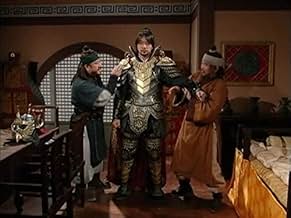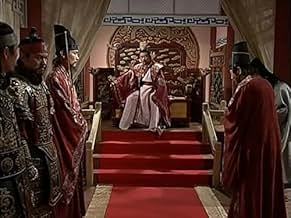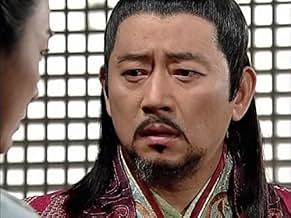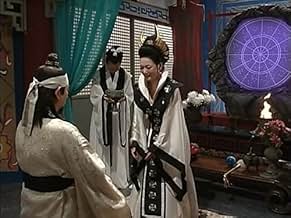NOTE IMDb
8,1/10
4,9 k
MA NOTE
Une épopée basée sur le mythe de Jumong, fondateur de l'ancien royaume coréen de Goguryeo.Une épopée basée sur le mythe de Jumong, fondateur de l'ancien royaume coréen de Goguryeo.Une épopée basée sur le mythe de Jumong, fondateur de l'ancien royaume coréen de Goguryeo.
- Récompenses
- 5 victoires et 7 nominations au total
Parcourir les épisodes
Avis à la une
courageous. handsome. wise. creator of a state. portrait result as mix between historical events and myths. using the emotions and feelings and facts who define each South Koreean historical drama. a film about a great hero, his wars, his love, his science to use the power. and his impressive reign. so, a manifesto. in same measure, a cultural and political one. because the series propose not only a story but, like many films from the same genre, a proud story. a legitimization for national values. and this did it special. for the small detail to be not exactly a tool of national propaganda but for use of basic ingredients who reminds to each viewer, from every countries, the values who define the national values of his past and tradition.
10ebossert
At no point in my lifetime have I felt so sentimental after viewing a television series. Yes, "Dae Jang Geum" (aka "A Jewel In the Palace") (2003) was magnificent, but "Jumong" (2006) is so overwhelmingly awesome on every possible level that it actually exceeds "Dae Jang Geum" in a number of ways. At this very moment I feel as if I've just completed a long journey with my closest friends, but now must say goodbye and move on. I kid you not, I feel hopelessly melancholy, because "Jumong" is an exceptional television series that has burrowed its way into my heart. This is special.
The scriptwriting is no less than phenomenal. There are multiple interests at play (royal family members, merchants, sorceresses, other kingdoms, tribes, etc.), and it's interesting to see them strategize and plot against one another. One of the most enjoyable aspects of this series are the strategy meetings that saturate each and every episode. Each character has his/her close confidants and meets with them regularly to discuss specific tactics to gain an advantage against their rivals, which makes for a seemingly non-stop display of cloak-and-dagger scheming. I personally find these exchanges exhilarating because they rely on intelligence and unorthodox (outside the box) thinking. There's a high emphasis on political coersion, unorthodox alliances, and subtle shifts in power from key events. The dialogue is great, crafting a number of exciting, clever exchanges between the players. Fantastic stuff! The obstacles are also very practical and interesting: discovering a sufficient salt supply, creating steel weaponry, obtaining national independence from hostile, more powerful kingdoms, etc. In addition, these conflicts help to accentuate an emotional resonance due to the large number of episodes dedicated to properly develop each obstacle and their climactic conclusions.
It's difficult for movies and television series to establish even a few memorable characters. "Jumong" has no less than 20. No, that is no overstatement, because 81 episodes (over a full hour each) allows for characters to be given heaping amounts of development that makes them multi-dimensional (even fallen comrades from the earlier episodes are never forgotten). Near the beginning it's somewhat easy to distinguish the "good guys" from the "bad guys", but as the series progresses it adds dimensions that ultimately result in haphazard classifications between "protagonists" and "antagonists." Some of the "good guys" will do "bad things" while some of the "bad guys" will do "good things." This will throw the viewer off guard, because at first the added dimensions may seem unwarranted, but over time these characters will express their actions within the light of logical decision-making. The use of multiple kingdoms adds greatly to this, because a kingdom may benefit from a specific alliance at one point in history, but may suffer greatly from maintaining that same alliance in the future.
Make no mistake, there are some clear protagonists, and within this grand journey there are a number impediments and setbacks that bring these characters closer to their confidants, as well as the viewer. The most impressive player, however, is the main protagonist (Jumong), who is sculpted into a truly charismatic, convincing leader who understands when to fight and when to express humility and passiveness. I have personally never seen a military leader as charismatic nor as convincing as "Jumong." He's quite literally the blueprint for leadership. The few other IMDb reviews already flesh out the other characters, so I will avoid that here, but I assure you that they are all great.
So, are there *any* flaws in this series. Surely, any cinematic endeavor that lasts 81+ hours is going to have a few. For example, the budget restrictions are evident in that the number of extras are a bit thin (especially during battles), but that's a minor flaw because most of the battles involve "detached advancements" that involve fewer extras. The scoring is also limited, but the choice tunes are excellent and will only seem "repetitive" when the viewer watches 3 or 4 episodes in a row, which may be inevitable given just how addictive this series is. Regardless of a few other negligible cons, this is a highly addictive period drama/action series that currently holds my official award for "Best Television Series Ever Made."
I said goodbye to my friends for now, but my DVD set awaits for a reunion in the future. I promise you that I will pay them multiple visits to experience the joy of the journey again.
The scriptwriting is no less than phenomenal. There are multiple interests at play (royal family members, merchants, sorceresses, other kingdoms, tribes, etc.), and it's interesting to see them strategize and plot against one another. One of the most enjoyable aspects of this series are the strategy meetings that saturate each and every episode. Each character has his/her close confidants and meets with them regularly to discuss specific tactics to gain an advantage against their rivals, which makes for a seemingly non-stop display of cloak-and-dagger scheming. I personally find these exchanges exhilarating because they rely on intelligence and unorthodox (outside the box) thinking. There's a high emphasis on political coersion, unorthodox alliances, and subtle shifts in power from key events. The dialogue is great, crafting a number of exciting, clever exchanges between the players. Fantastic stuff! The obstacles are also very practical and interesting: discovering a sufficient salt supply, creating steel weaponry, obtaining national independence from hostile, more powerful kingdoms, etc. In addition, these conflicts help to accentuate an emotional resonance due to the large number of episodes dedicated to properly develop each obstacle and their climactic conclusions.
It's difficult for movies and television series to establish even a few memorable characters. "Jumong" has no less than 20. No, that is no overstatement, because 81 episodes (over a full hour each) allows for characters to be given heaping amounts of development that makes them multi-dimensional (even fallen comrades from the earlier episodes are never forgotten). Near the beginning it's somewhat easy to distinguish the "good guys" from the "bad guys", but as the series progresses it adds dimensions that ultimately result in haphazard classifications between "protagonists" and "antagonists." Some of the "good guys" will do "bad things" while some of the "bad guys" will do "good things." This will throw the viewer off guard, because at first the added dimensions may seem unwarranted, but over time these characters will express their actions within the light of logical decision-making. The use of multiple kingdoms adds greatly to this, because a kingdom may benefit from a specific alliance at one point in history, but may suffer greatly from maintaining that same alliance in the future.
Make no mistake, there are some clear protagonists, and within this grand journey there are a number impediments and setbacks that bring these characters closer to their confidants, as well as the viewer. The most impressive player, however, is the main protagonist (Jumong), who is sculpted into a truly charismatic, convincing leader who understands when to fight and when to express humility and passiveness. I have personally never seen a military leader as charismatic nor as convincing as "Jumong." He's quite literally the blueprint for leadership. The few other IMDb reviews already flesh out the other characters, so I will avoid that here, but I assure you that they are all great.
So, are there *any* flaws in this series. Surely, any cinematic endeavor that lasts 81+ hours is going to have a few. For example, the budget restrictions are evident in that the number of extras are a bit thin (especially during battles), but that's a minor flaw because most of the battles involve "detached advancements" that involve fewer extras. The scoring is also limited, but the choice tunes are excellent and will only seem "repetitive" when the viewer watches 3 or 4 episodes in a row, which may be inevitable given just how addictive this series is. Regardless of a few other negligible cons, this is a highly addictive period drama/action series that currently holds my official award for "Best Television Series Ever Made."
I said goodbye to my friends for now, but my DVD set awaits for a reunion in the future. I promise you that I will pay them multiple visits to experience the joy of the journey again.
I became addicted to this fine Korean drama series in the late spring of 2007, when I got sick of paying my cable company over $50 a month for premium service and switched back to the Limited Basic package for less than $20/month. As a result I was forced to look through some of the foreign-language-network offerings, and lo and behold, found this gem of a quasi-historical Korean epic costume drama on AZN.
Now admittedly, there is a fair bit of pretty silly stuff going on in this series (see the Minuses section below), but the good far outweighs the bad. I especially like the humorous character vignettes, for instance the Iron Chamber master Mo Palmo always cracks me up. :)
**Pluses:**
* Emperor Kumwa - The MacBeth of Jumong; carries much of the first 50 episodes of the show. Watching the actor who plays him, I can't help being reminded a little bit of Toshiro Mifune.
* Prime Minister Unavoidable - with a name like that, how can you not like this guy?
* Sorceress Yeo Mieul (I admit she took a while to grow on me)
* Sosuhno - Love those take-charge gals who can do it without being nasty
* Prince Taeso - Every great drama needs a quality bad guy, and the conflicted Taeso is a worthy foil to Jumong.
* Prince Youngpo - The feckless prince #2. I love it when he does his "evil scheming" face. :D
* Keru Troop Chief Yuntabal - Like the name says, this guy has major, um, guts, I love it when he (literally) laughs in the face of the bad guys. Also just plain a fine dramatic actor.
* Oi, Mari, Hyoppo: Jumong's 3 Musketeers. Especially like the "forbidden love" subplot involving tough-guy Hyoppo and someone from Sosuhno's Keru troop. The later addition of the reformed bandits as their 3 counterparts and oft-times rivals makes for a great ongoing source of tension and humor.
* Mo Palmo and his friend, the chief of the Guards - absolutely hilarious pair, they're like the Laurel and Hardy of Korean Costume drama.
**Minuses:**
But as I said, the negatives are far outweighed by the good stuff - unless you're the kind of person who insists on "realism" (whatever that means) in all aspects of a show.
All in all, excellent entertainment for the whole family - highly recommended. 8/10
Now admittedly, there is a fair bit of pretty silly stuff going on in this series (see the Minuses section below), but the good far outweighs the bad. I especially like the humorous character vignettes, for instance the Iron Chamber master Mo Palmo always cracks me up. :)
**Pluses:**
- Gorgeous costumes;
- Good acting, especially from the actors who play the following characters:
* Emperor Kumwa - The MacBeth of Jumong; carries much of the first 50 episodes of the show. Watching the actor who plays him, I can't help being reminded a little bit of Toshiro Mifune.
* Prime Minister Unavoidable - with a name like that, how can you not like this guy?
* Sorceress Yeo Mieul (I admit she took a while to grow on me)
* Sosuhno - Love those take-charge gals who can do it without being nasty
* Prince Taeso - Every great drama needs a quality bad guy, and the conflicted Taeso is a worthy foil to Jumong.
* Prince Youngpo - The feckless prince #2. I love it when he does his "evil scheming" face. :D
* Keru Troop Chief Yuntabal - Like the name says, this guy has major, um, guts, I love it when he (literally) laughs in the face of the bad guys. Also just plain a fine dramatic actor.
* Oi, Mari, Hyoppo: Jumong's 3 Musketeers. Especially like the "forbidden love" subplot involving tough-guy Hyoppo and someone from Sosuhno's Keru troop. The later addition of the reformed bandits as their 3 counterparts and oft-times rivals makes for a great ongoing source of tension and humor.
* Mo Palmo and his friend, the chief of the Guards - absolutely hilarious pair, they're like the Laurel and Hardy of Korean Costume drama.
- Gorgeous Women (I'm a guy, so I admit I was looking more at the ladies ;): Sosuhno, Ye Soya, Buyong and Lady Yuhwa are all major hotties. Even the bad girls have their moments. :) And did I mention the costumes?
**Minuses:**
- Jumong: I know I'm probably going to catch a lot of flak for his, but Song Il-Guk's portrayal just lacks something. Perhaps this is partly the fault of the series writers, but it's just not as convincing as it should be.
- Too many royal people sitting at fancy carved tables doing nothing at the start of scenes - I mean, don't these people read, or do needlework, or paint, or play board games? A missed opportunity for adding depth and texture to the series.
- Fight scenes way too unrealistic (at least for my taste) - OK, I realize you probably can't have severed heads, limbs and guts flying around without alienating a large part of the audience, but could we maybe occasionally have a little *blood*? (And not just a dab on the tip of some guy's sword). And, all these good guys fighting brutal battles and coming out without a scratch? (except for "designated manly upper arm wound guy".) Or even breaking a sweat...
But as I said, the negatives are far outweighed by the good stuff - unless you're the kind of person who insists on "realism" (whatever that means) in all aspects of a show.
All in all, excellent entertainment for the whole family - highly recommended. 8/10
Heroic. Impresive. Subtle. Product of Coreean industry who, between Hollywood and Bolywood makes beautiful and good movies. Jumong is same legend with same pieces like many other films. The difference is the courage to define an era. And its heart - a spectacular man. Love, hate, survey, fights and wars , beauty and feelings are present but it is not a another play about old ages. May be propaganda. In small measure. In fact, it is a lesson. Yes, a history lesson but a values lesson and more that. A fresco but , in same time, a mirror. A speech about a roots time but a seductive way to define a nation.It is strange to say anything about a kind of movie. But it is nice to discover it with each word - skin of its images.
My kids go to a dual language program (Spanish English) plus we speak a third language at home. So naturally they are comfortable with movies that are in foreign language.
My son (8) developed his reading from this series (by being forced to reading the subtitles) no doubt and it is really nice to expose them to a different ethos and not the Hollywood formula crap. We are still on the 16th episode, so quite a few more to go.
The complex plot and the ambiguous morality at times is really challenging. The main actor a little weak I agree but maybe "he" will grow into it as well
My son (8) developed his reading from this series (by being forced to reading the subtitles) no doubt and it is really nice to expose them to a different ethos and not the Hollywood formula crap. We are still on the 16th episode, so quite a few more to go.
The complex plot and the ambiguous morality at times is really challenging. The main actor a little weak I agree but maybe "he" will grow into it as well
Le saviez-vous
- AnecdotesJumong had the highest ratings of all Korean dramas in 2006 in Korea.
- ConnexionsFollowed by Baramui Nara (2008)
- Bandes originalesThe World Calls Me
Performed by Insooni
Meilleurs choix
Connectez-vous pour évaluer et suivre la liste de favoris afin de recevoir des recommandations personnalisées
- How many seasons does Jumong have?Alimenté par Alexa
Détails
- Date de sortie
- Pays d’origine
- Langue
- Aussi connu sous le nom de
- The Book of the Three Hans
- Lieux de tournage
- Société de production
- Voir plus de crédits d'entreprise sur IMDbPro
- Durée1 heure
- Couleur
Contribuer à cette page
Suggérer une modification ou ajouter du contenu manquant
































